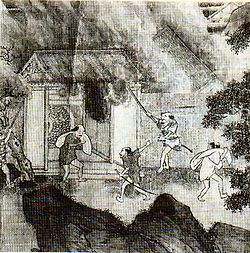Portal:Piracy/Selected article/Week 33 2007
Wōkòu or Japanese pirates (Chinese character: 倭寇; Chinese pronunciation: wōkòu; Japanese pronunciation: wakō; Korean pronunciation: 왜구 waegu) were pirates who raided the coastlines of China and Korea from the thirteenth century onwards. Originally, the Wokou were mainly soldiers, ronin, merchants and smugglers from Japan, but became predominantly from China two centuries later.
The early phase of Wōkòu activity began in the 13th century and extended to the second half of the fourteenth century. Japanese pirates from only Japan concentrated on the Korean peninsula and spread across the Yellow Sea to China. Ming China implemented a policy to forbid civil trade with Japan while maintaining governmental trade (Haijin). The Ming court believed that limiting non-government trade would in turn expel the Wōkòu. But haijin wasn't successful as it instead forced many Chinese merchants to protect their own interests by trading with Japan illegally. This led to the second major phase of Wōkòu activity which occurred in the early to mid-sixteenth century, where Japanese pirates colluded with their Chinese counterparts and expanded their forces. During this period the composition and leadership of the Wōkòu changed significantly to become Chinese. At their height in the 1550s, the Wōkòu operated throughout the seas of East Asia, even sailing up large river systems such as the Yangtze.
The term "Wōkòu" is a combination of "Wō" (倭) referring to Japanese, and "kòu" (寇), meaning "bandit; enemy; invasion". The earliest textual reference to the term "Wōkòu" as Japanese invader comes from Gwanggaeto Stele erected in 414. (more...)

